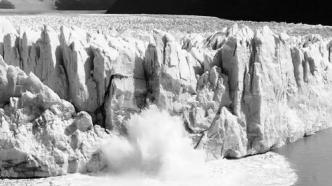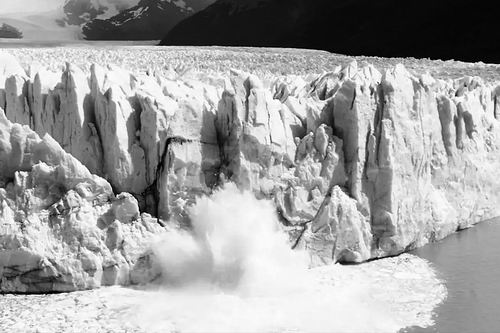

The glacier crashes into the sea. Credit: Juan Maria Pazos/Alamy
From shrinking sea ice to the worst heat waves and collapsing ice shelves, extreme events in Antarctica could be a harbinger of worse to come. On August 8, Martin Siegert of the University of Exeter in the United Kingdom and his colleagues assessed the serious impact on Antarctica. They published an article in "Frontiers of Environmental Science" that extreme events in Antarctica will become more common and the consequences These include accelerating the loss of glaciers and causing coastal flooding around the world.
"I started doing Antarctic research 30 years ago," Siegert said. "Surprise is one thing, shock is another." The temperature was 38.5°C above normal, the most extreme anomaly on Earth. If such an event happened in the UK in summer, temperatures in London would reach 60C, Siegert said.
March temperatures in Antarctica are typically around -50°C, so the warming from the event didn't exceed freezing, but if the anomaly had occurred during Antarctica's summer, it would have melted ice deep inland, Siegert said. The warm and humid air from Australia is the direct cause of all this. Normally, the circular wind around Antarctica, known as the polar vortex, blocks warm air from the north, but in this case, the warm air traveled farther inland, Siegert said.
First to be affected is sea ice The formation of sea ice around Antarctica has been unexpected and hit a record high in the winter of 2014. But each winter since then has formed far less sea ice than usual, with 2017 seeing record low sea ice extent. This record was broken in 2022 and will be broken again this year. Caroline Holmes of the British Antarctic Survey said: "July set a record for the lowest winter sea ice this year."
Then there are ice shelves, which are formed by glaciers that flow into the ocean, not from frozen seawater like sea ice. Massive ice shelves floating around Antarctica are shrinking. "We've seen dramatic changes in the extent of the ice shelves around Antarctica. In some cases, some ice shelves have completely collapsed." Anna Hogg of the University of Leeds in the United Kingdom said that after the collapse of the Larsen B ice shelf in 2002, behind it The glacier flows 8 times faster.
What's more, one extreme event increases the likelihood of other extreme events. For example, warm air reaching Antarctica reduces sea ice and causes its surface to melt. "The warmer weather is triggering unprecedented surface melt and melt pools on the ice sheet." Hogg said that this water can flow through the cracks to the bottom of the glacier, lubricating the glacier and accelerating its flow.
On ice shelves, meltwater can deepen fissures, causing icebergs to break off and ice shelves to rupture completely. "We are deeply concerned about the increasing frequency and intensity of extreme events and their knock-on effects," Siegert said.
This is important to the world for two reasons, he said. First of all, Antarctica is a huge ice bank, and the melting of ice causes sea level to rise every year. Second, its white surface reflects energy back into space to help cool the planet, but now white ice or snow is being replaced by dark ocean or land.
"In the next few years, Antarctica stops being the planet's refrigerant and starts acting as a radiator, and that's a real danger," Siegert said.
Antarctica has few weather stations and records don't go back very far, making it difficult to determine whether individual extreme events are the result of global warming, the researchers said. But some extreme events, such as the 18.6°C recorded at the Esperanza research station in 2020, the highest temperature in Antarctica, have been shown to be more likely to be caused by global warming, Siegert said. "We have reason to think that this is also true of other extreme events," he said. "Unfortunately, this is the worst-case scenario of ice sheet instability."
Related paper information:
https://doi.org/10.3389/fenvs.2023.1229283